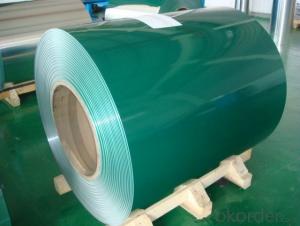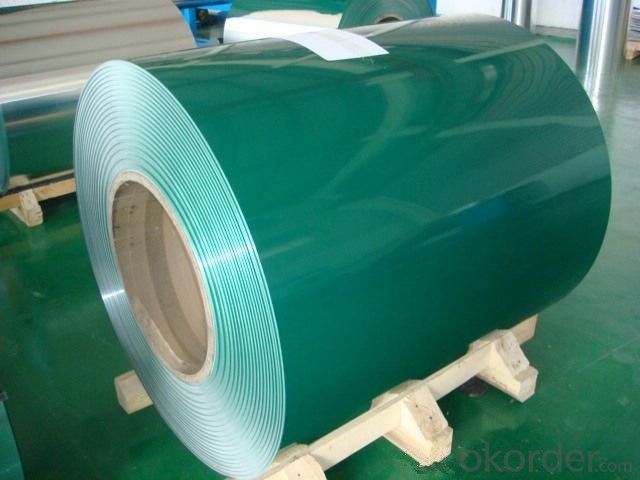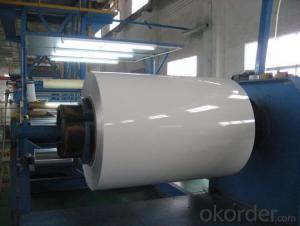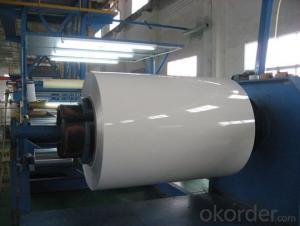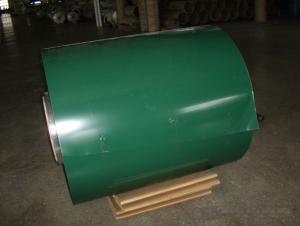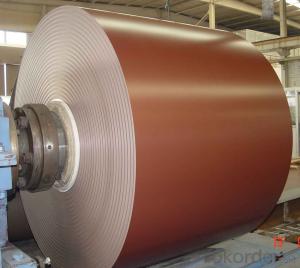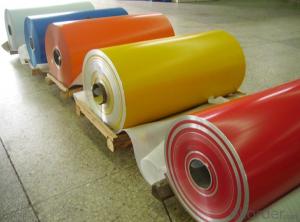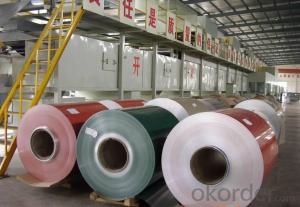RAL 5021 PVDF 25 Micros Coated Sheet Aluminum Coil
- Loading Port:
- Qingdao
- Payment Terms:
- TT OR LC
- Min Order Qty:
- 2 m.t.
- Supply Capability:
- 50000 m.t./month
OKorder Service Pledge
OKorder Financial Service
You Might Also Like
Specification
Description
Alloy | 1050, 1060,1100, 3003 3004 3105 3A21 5005 5052 etc |
Temper | O/H12/H14/H1/H18/H32/H34/H36/H38//H111/H112/H116/H321/T6/T651/T3/T351 etc |
Thickness | 0.1mm to 6mm |
Width | 20mm to 3300mm |
Coil weight | 100kgs to 6 tons depends on actual requirement |
Core material | Aluminum or paper |
Coil inner diameter | 75mm, 150mm, 200mm, 300mm, 405mm, 505mm or as required |
Appplication | construction, roofing, decoration, lamping etc |
Package | eye to wall or eye to the wall for aluminum coil with wood pallet (wooded case also available) |
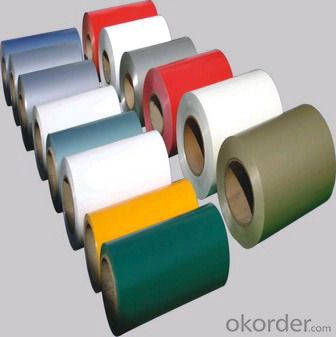
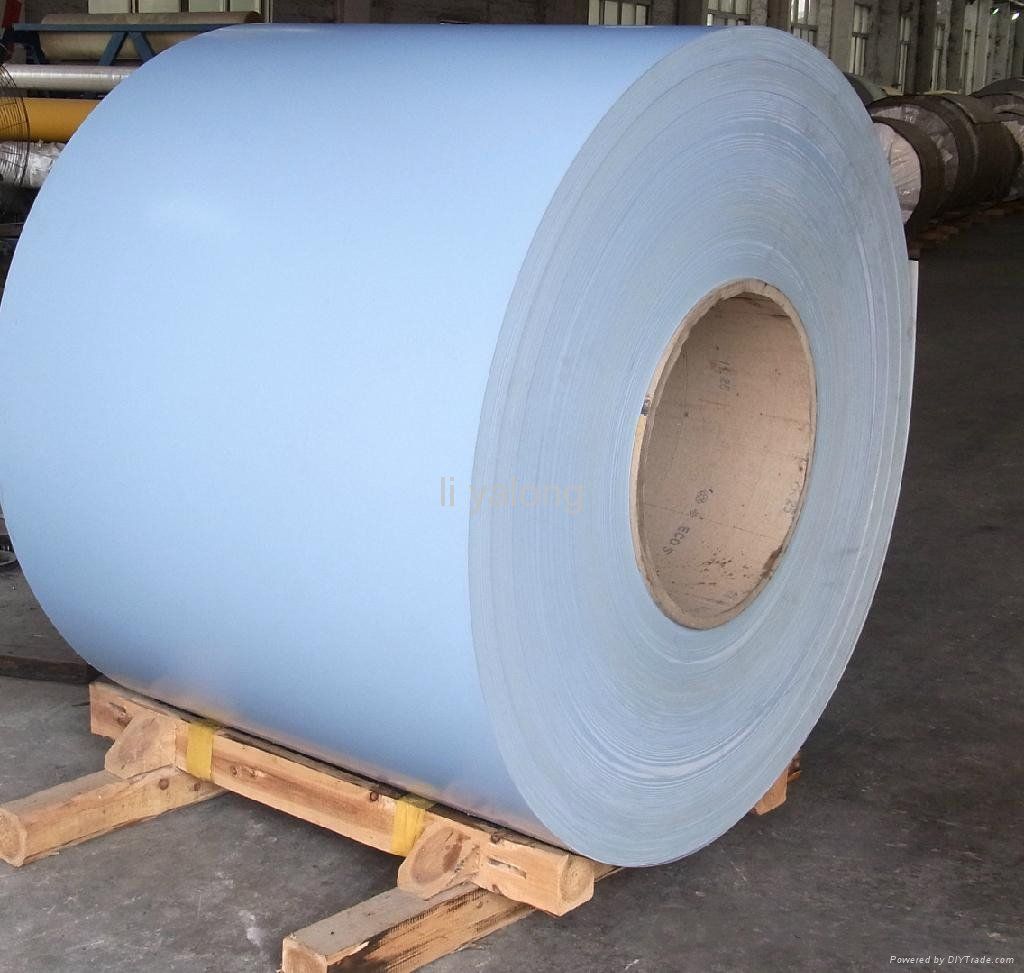
PE and PVDF Painting
Polyester Coatings (PE)
PE (polyester) coatings exhibit an excellent combination of hardness, flexibility, flow, appearance, and superior resistance to dirt retention in indoor and outdoor applications. These coatings are highly resistant to abrasion, metal marking, staining, and marring, and require minimal maintenance. Glazetech uses polyester paints which provide excellent colour and gloss retention properties.
Polyvinylidene Fluoride Coatings (PVDF)
PVDF (polyvinylidene fluoride) is a chemical resistant thick film barrier coating commonly used in architectural applications where both excellent appearance and substrate protection must be maintained over a long period of time. This coating is unaffected by most chemicals and solvents and has excellent wear and abrasion resistance. PVDF also has a high dielectric strength, excellent resistance to weathering and the ability to self extinguish.
Application
Widely used in manufacturing of products as well as other industrial applications like:
Products Materials: PP cap stock, the traffic sign, air-conditioner heat and exchangers, food container, household foil, pharmaceutical packing, cigarettes packing etc.
Building Materials: aluminum curtain wall base plate, ACP, aluminum, ceilings, aluminum sheets, honeycomb panels and aluminum roofing, lighting decoration, household electrical appliances, food package (such as pop can cover & ring-pull), furniture ect.
FAQ
--Q: Do you provide free samples?
--A: Yes, free samples will be sent to you on freight at destination.
--Q: Can I get your latest products catalogue?
--A: Yes, it will be sent to you in no time.
--Q: What is the MOQ?
--A: 2 tons
--Q: What are your payment terms?
--A: We accept L/C, T/T.
--Q: What kinds of alloy can you supply?
--A: 1000 series: 1050, 1060, 1070, 1100, 1145, 1200
3000 series: 3003, 3004, 3105, 3104
5000 series: 5052, 5083, 5754, 5182
6000 series: 6061, 6063, 6062, 6063
8000 series: 8011, 8021
--Q: What kinds of temper can you supply?
--A: O-H112: O,H12,H14,H16,H18,H22,H24,H26,H,32,H34,H111,H112
T3, T4, T6
- Q: anyone know where to buy aluminium birdcage ?
- Pet store. Ebay. Church Rummage sale. garage sale.
- Q: What are the potential applications of laminated aluminum coils?
- Laminated aluminum coils have a wide range of potential applications. They can be used in industries such as electrical, automotive, aerospace, and construction. Some specific applications include electrical transformers, heat exchangers, automotive radiators, air conditioning systems, and architectural facades. The lamination process enhances the durability, heat and corrosion resistance, and electrical conductivity of the coils, making them suitable for various demanding environments and applications.
- Q: Can aluminum coils be used in electrical transformers?
- Yes, aluminum coils can be used in electrical transformers. Aluminum is often chosen as an alternative to copper due to its lower cost, lighter weight, and better thermal conductivity. However, aluminum coils may require larger sizes to achieve the same electrical performance as copper coils.
- Q: What is the typical coefficient of thermal expansion for aluminum coils?
- The typical coefficient of thermal expansion for aluminum coils is approximately 23 x 10^-6 per degree Celsius. This means that for every degree Celsius increase in temperature, the length of the aluminum coil will expand by 23 parts per million. The coefficient of thermal expansion is an important factor to consider when designing and working with aluminum coils, as it affects their dimensional stability and can cause thermal stresses in the material when exposed to temperature changes.
- Q: What are the typical lead times for ordering aluminum coils?
- The typical lead times for ordering aluminum coils can vary depending on various factors such as the supplier, quantity ordered, and current market conditions. Generally, lead times can range from a few weeks to several months. For standard or readily available aluminum coil sizes and grades, lead times are usually shorter and can be fulfilled within a few weeks. This is because suppliers often maintain a certain level of inventory for popular products. However, for customized or specialty aluminum coils, lead times tend to be longer. This is because these coils may require specific dimensions, finishes, or alloys that are not readily available. The production process for such coils involves additional steps, such as casting, rolling, and surface treatments, which can extend the lead time. Additionally, market conditions and supplier capacities can also impact lead times. During periods of high demand or when there are supply chain disruptions, lead times for aluminum coils may increase. Conversely, during slower periods or when suppliers have excess capacity, lead times may be shorter. To get an accurate estimate of lead times, it is recommended to contact aluminum coil suppliers directly. They will be able to provide specific information based on their current production schedules and inventory levels.
- Q: Can aluminum coils be used for signage purposes?
- Yes, aluminum coils can be used for signage purposes. Aluminum is a versatile and lightweight material that is commonly used in the signage industry. It has excellent corrosion resistance, making it suitable for both indoor and outdoor applications. Aluminum coils can be easily cut and formed into various shapes and sizes, allowing for customizable signage designs. Additionally, aluminum is highly durable and can withstand harsh weather conditions, making it a long-lasting option for signage. The coils can be painted or coated with different finishes to achieve the desired aesthetic appeal, while also providing protection against fading and scratching. Overall, aluminum coils are a popular choice for signage purposes due to their versatility, durability, and aesthetic appeal.
- Q: What are the different pre-treatment methods for aluminum coils?
- Aluminum coils can undergo various pre-treatment methods to prepare their surface for further processing or coating. These methods serve different purposes and can be chosen based on specific requirements. One pre-treatment method is degreasing, which eliminates oils or greases on the coil surface. Solvents or alkaline cleaners are used for degreasing, depending on the application's needs. Etching is another pre-treatment method that removes surface oxides or contaminants from the aluminum coils. This can be achieved through acidic solutions or mechanical techniques like sandblasting or brushing. Phosphating, a commonly used pre-treatment method, involves applying a phosphate coating to the coil surface. This coating enhances adhesion for subsequent coatings or paints and provides corrosion resistance. Conversion coating is a popular pre-treatment method that forms thin layers of inorganic compounds on the coil surface. These coatings improve adhesion for subsequent coatings or paints and offer corrosion resistance. Common conversion coatings for aluminum include chromate, chromate-free, or anodizing. To summarize, the pre-treatment methods for aluminum coils include degreasing, etching, phosphating, and conversion coating. Each method has a specific purpose in preparing the coil surface for further processing or coating, chosen based on the application's requirements.
- Q: Are aluminum coils suitable for beverage can manufacturing?
- Yes, aluminum coils are suitable for beverage can manufacturing. Aluminum is a preferred material for beverage cans due to its various advantageous properties. Firstly, aluminum is lightweight, which makes it easy to transport and handle. This is particularly important for the beverage industry, where large quantities of cans are produced and distributed. Additionally, aluminum is highly malleable, allowing it to be formed into the desired shape without losing its structural integrity. This makes it ideal for can manufacturing, as it can be easily shaped into a can's cylindrical form and withstand the pressure from carbonated beverages. Moreover, aluminum is a non-toxic material, ensuring that it does not contaminate the beverages stored in the cans. It also provides a barrier against light, oxygen, and moisture, which helps to preserve the taste and quality of the beverages. Furthermore, aluminum is recyclable, making it an environmentally friendly choice for can manufacturing. The recycling process for aluminum requires significantly less energy compared to producing new aluminum, making it a sustainable material option. Overall, the suitability of aluminum coils for beverage can manufacturing is evident due to its lightweight nature, malleability, non-toxicity, preservation properties, and recyclability.
- Q: What are the common surface finishes for aluminum coils in the aerospace industry?
- The common surface finishes for aluminum coils in the aerospace industry include mill finish, anodized finish, and painted finish.
- Q: Can aluminum coils be recycled multiple times?
- Yes, aluminum coils can be recycled multiple times. Aluminum is a highly recyclable material, and the recycling process for aluminum coils involves melting them down to create new coils. This means that aluminum coils can be recycled indefinitely without losing their properties or quality.
Send your message to us
RAL 5021 PVDF 25 Micros Coated Sheet Aluminum Coil
- Loading Port:
- Qingdao
- Payment Terms:
- TT OR LC
- Min Order Qty:
- 2 m.t.
- Supply Capability:
- 50000 m.t./month
OKorder Service Pledge
OKorder Financial Service
Similar products
Hot products
Hot Searches
Related keywords
